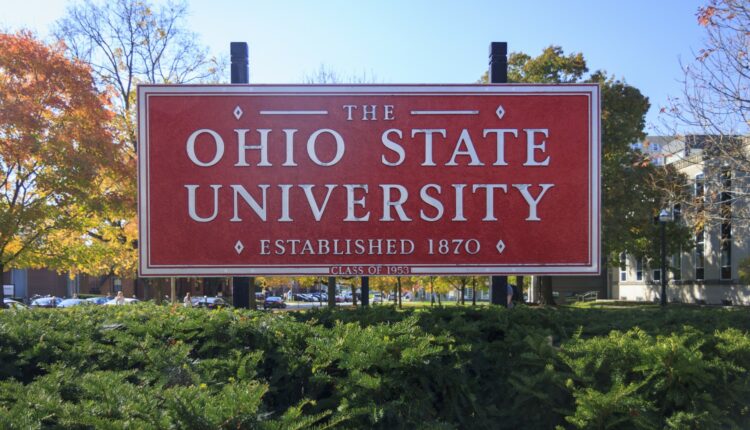Ohio State University’s professor awarded U.S. Army medal for leadership training
Angus Fletcher, a professor in The Ohio State University Department of English, has been awarded the U.S. Army’s Public Service Commendation Medal for training special operations personnel in leadership and decision-making skills.
The Public Service Commendation Medal (PSCM) is the fourth-highest public service decoration that the Army can bestow upon a civilian. The PSCM is awarded for distinguished service or achievements that contribute to the accomplishment of U.S. Army Public Service Commendation Medal
Fletcher said he was honored to receive the commendation, especially since he was initially surprised when the Army approached him about his work. Fletcher is a story scientist: His research focuses on how creativity works in the brain.
“I had a series of stereotypes about the Army – the Army’s about order and discipline,” he said. “And they said, ‘No, no, Angus, what we need is we need to empower our individual soldiers to be able to function when the plan breaks down.’ Basically, how do you come up with a second plan, what do you do if your first plan breaks? How do you create that next plan?”
Fletcher started out in neuroscience, working for four years in a University of Michigan Medical School neurophysiology laboratory. It was during this time that Fletcher says he learned that the brain functions less like a computer that processes data and is more driven by emotion and story.
Fletcher changed his academic focus and went on to earn a Ph.D. in literature from Yale University. He has since worked with numerous companies, including animation studio Pixar, on how narrative storytelling and creative technology stem from the same areas in the brain.
Fletcher said Army officials told him that they sought him out because they heard about his work with Ohio State’s Max M. Fisher College of Business and other business schools around the country, helping students train the brain’s creativity centers. He began working with the Army’s Command and General Staff College two years ago, both virtually and by conducting in-person sessions at military bases.
“If you can come up with an original action and you put two actions together, that’s an original plan. And then you start to put a lot of actions together, and that’s an original strategy,” Fletcher said. “We wanted to train up these areas of the brain that allow you to come up with original actions, plans, plus strategies, so that when you’re in an environment that’s a contested space, when someone else is trying to break your plan, you can come up with a new plan that allows you to achieve what it was you wanted to do in the beginning.”
Kenneth Long, an associate professor at the Command and General Staff College, said Fletcher’s work helps the Army to enhance existing training protocols that equip personnel with critical decision-making skills on and off the battlefield.
“It seems like all the easy problems are solved, so what’s left is something that requires a human on the spot to be able to rapidly figure out … what’s happening here and what can we do about it?” Long said. “We’re trying to make that cognitive shift to adaptive leadership … as opposed to just … knee-jerk reactions, so that causes us to look at foundational cognitive skills that all leaders need to have.”
Lt. Col. Thomas Gaines, a Wake Forest University military science professor, said he and Fletcher assist special operations forces in honing their resourcefulness.
“Fortunately, the Army has a bunch of people who are pretty creative and adaptable,” Gaines said. “The question that Angus and I have been hunting down is, how do we optimize each individual’s ability to be adaptive and creative? Not everybody’s going to be the same.”
Fletcher’s work helps trainees “recognize that you have to make a decision. In order to do that, you have to understand how your mind works and make that decision as good as possible,” Gaines said.
Just as Army personnel draw on Fletcher’s training to sharpen creative problem-solving skills in military operations, Fisher students do the same in business settings, said Anil Makhija, dean and John W. Berry, Sr. Chair in Business at Fisher.
“We’re extremely fortunate that Angus has chosen to share his expertise and unique teaching abilities to enhance the classroom experiences of our executive education students,” he said. “This cross-functional instruction underscores our commitment to providing business students with a holistic education that elevates critical thinking and self-reflection.”
Nicole Cochran, a member of Fisher’s Executive MBA Class of 2023, described Fletcher as one of the most engaging and dynamic professors she’s encountered.
“It is challenging to articulate the deep multitude of pathways he opens in our minds,” she said. “Angus unlocks the creative potential door in students’ minds and facilitates an understanding of the opportunity we each have to choose to step through and see what is on the other side.”
As a business student, Cochran said she appreciates Fletcher’s ability to apply the cognitive processes involved in narrative storytelling to the business world.
“Angus embodies truth, authenticity, humility and humor,” she said. “His ability to communicate through narrative is masterful. Every student has met a better version of themselves as a result of Angus’ teaching and will undoubtedly become a better leader.”

